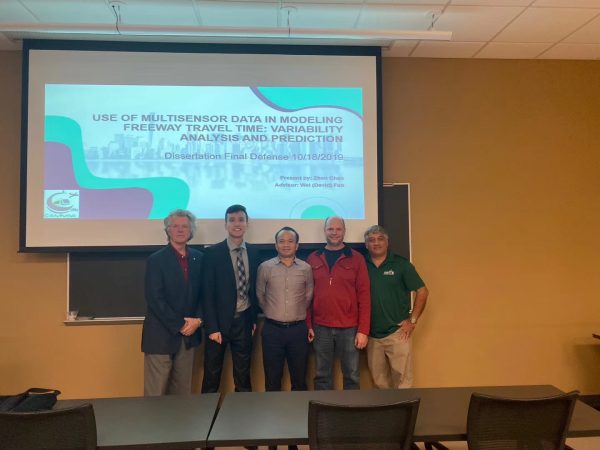CAMMSE Ph.D. Student Zhen Chen Successfully Defended His Dissertation Entitled “Use of Multisensor Data in Modeling Freeway Travel Time: Variability Analysis and Prediction”

Nowadays anonymous vehicle probe data have been greatly improved in both data coverage and data fidelity. Thus, vehicle probe data have become a reliable source for freeway travel time analysis. The travel time variability is highly complex as it is affected by a wide variety of factors. A better understanding of travel time variability patterns can help the decision makers plan, design, operate, and manage a more efficient highway system.
Moreover, travel time prediction also plays a significant role in traffic data analysis and applications as it can assist in route planning and reducing traffic congestion. With the development of artificial intelligence technologies, various novel prediction methods have been developed accordingly in recent years. Machine learning is an example of a data driven method which aims to increase efficiency and accuracy of predictions. Recently, different machine learning-based approaches, such as neural network, ensemble learning, and support vector machines (SVM), have been employed by the researchers and the results indicate that such approaches for prediction are adaptable and can give better performances than traditional models.
This research is intended to systematically analyze how travel time distributes and varies with respect to the time of day, day of week, year, and weather conditions. In addition, an advanced machine learning-based approach (i.e. XGBoost model) is employed to predict the freeway travel time. Detailed information about the input variables and data pre-processing is presented. Parameters of the XGBoost model are introduced and the parameter tuning process is also discussed. The relative importance of each variable in the model is presented and interpreted. Optimized modeling results of the proposed XGBoost travel time prediction model are evaluated and compared with those of the gradient boosting model. The results also demonstrate that the developed XGBoost travel time prediction model significantly improves the computation accuracy and efficiency. Summary and conclusions of the whole study are made and further research directions are given at the end of study.